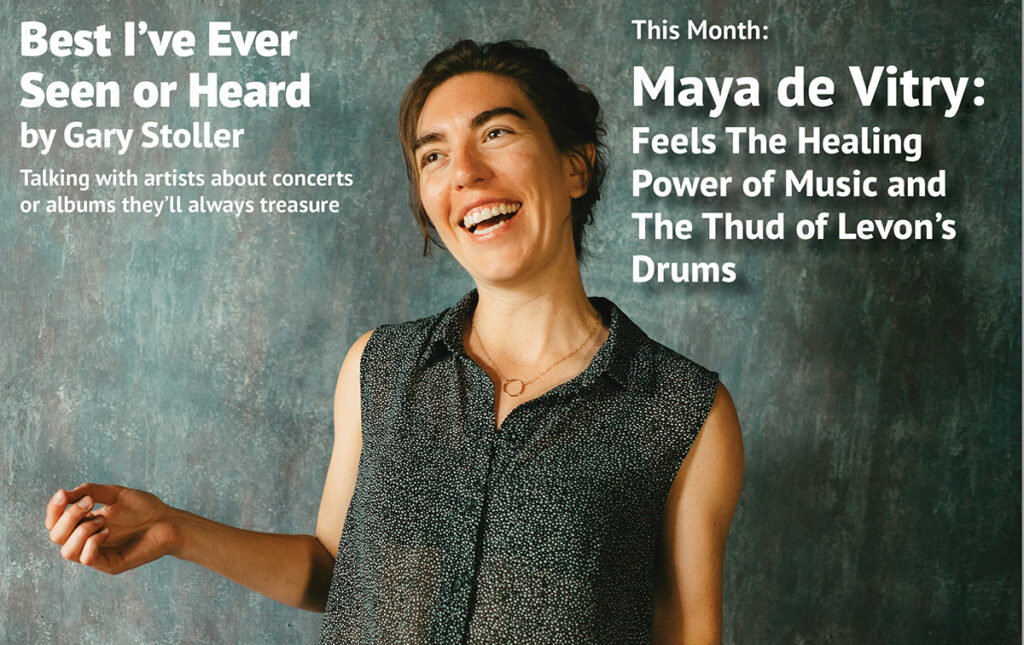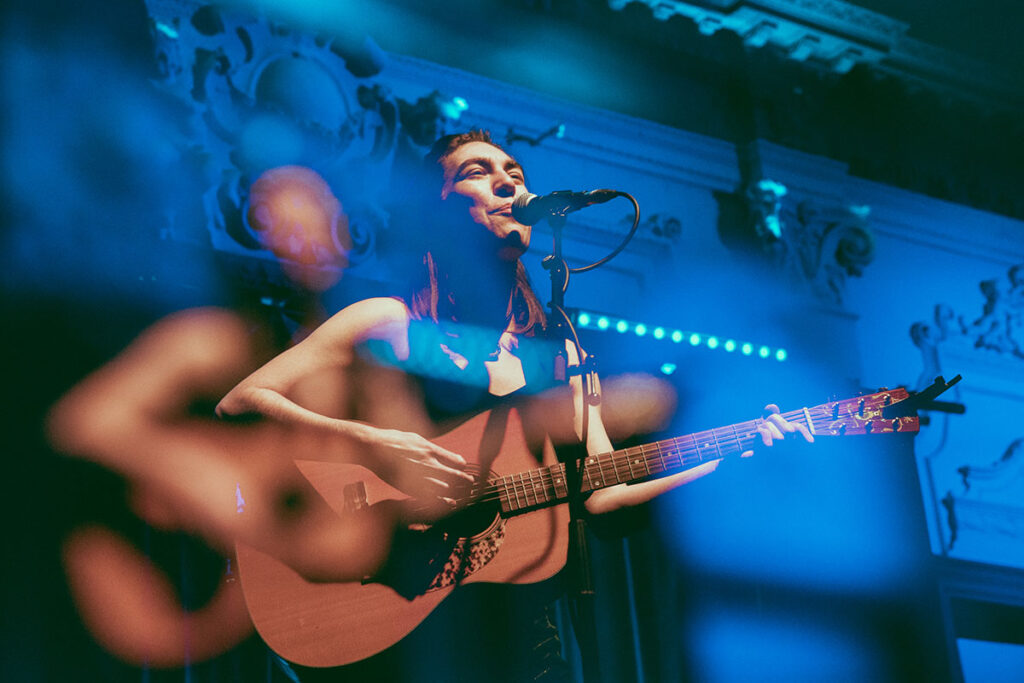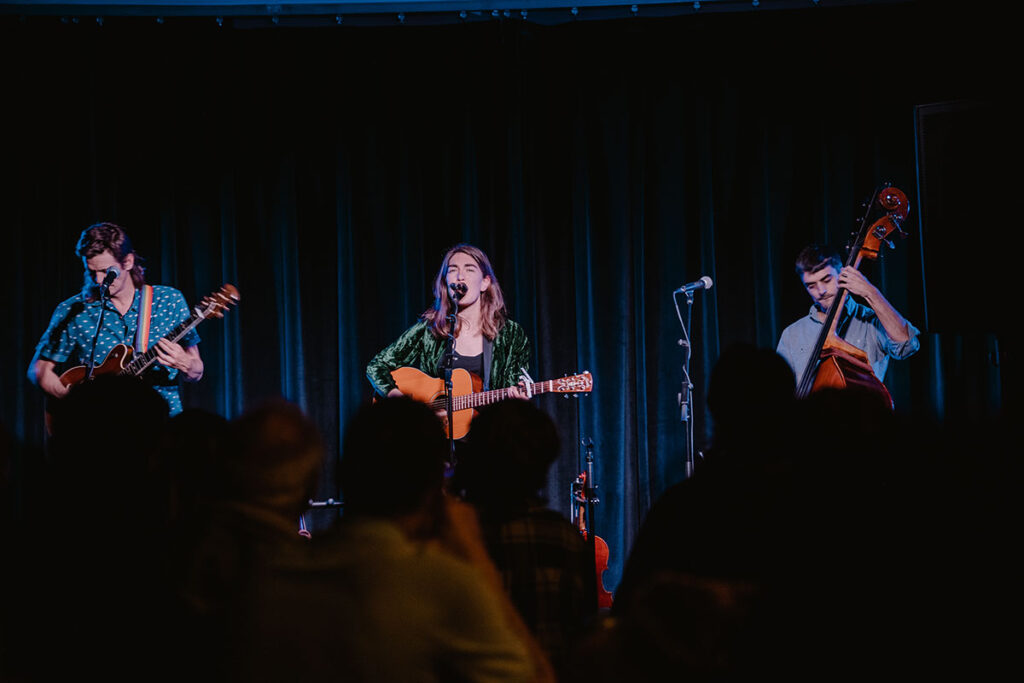
Singer-songwriter Maya de Vitry has a voice of gold, but that doesn’t stop her from appreciating other musical voices.
De Vitry attended a show by the Psycodelics, a Charleston, South Carolina, funk-rock group with touches of disco, jazz and blues, and was floored by the performance of lead singer Cam Wescott.
De Vitry, who has released three full-length solo albums after four albums with the Stray Birds, says Wescott and the Psycodelics also incorporated soul and R&B, and it was an “influential concert experience.”
Wescott “was so fully embodying music with a capital m,” de Vitry says. “It was a level of commitment, intensity and belief in music, like he was comfortably singing in a whole other dimension. It was a commitment that I honestly rarely ever see. It was like seeing a total lack of self-consciousness, witnessing someone wholly giving themselves over to music.”
De Vitry, who plays guitar and violin, could have been describing herself. Her songs are deep and heartfelt, and her supple, captivating voice draws the listener in, hungrily waiting for the next line.

“I am not a trained singer, but I do my best to communicate through my voice,” de Vitry says. “All the musical things, such as phrasing, I’ve studied on the violin or the piano I can apply to singing. All the listening skills from studying and being immersed in other languages at times, like French and Spanish, I can apply to singing, to the subtleties of a word, to dynamics, to emphasize something or to bring color or a certain shade of feeling to a word.”
De Vitry’s powerful voice seems to have gained more power and prominence since the three-member Stray Birds disbanded in 2018.
“My voice has most significantly changed since leaving the single-mic setup that the Stray Birds used for most of our touring years,” she explains. “Since I’ve switched over to primarily using my own microphone, I can hear nuances better in the monitor mix. I can actually use the microphone as a tool, and I can stand at the right height to sing in a relaxed way, rather than kind of contorting my body all the time to try to puzzle-piece my way into the one shared microphone.”
How has her music as a solo artist differed from her seven years creating music with the Stray Birds, which featured three vocalists?
“As a solo artist, I can put more thought into the emotional arc of each record,” de Vitry says. “I can also pivot between styles more easily and move more fluidly between genres or instrumentation without worrying about what it means for the identity of a band. In my live show, there is a lot more space for me to be many versions of myself throughout the night, rather than just the kind of quiet girl role. There’s also more room for spontaneity. When I feel present enough to lead my band through the unknown, we usually go on stage without a set list, so there’s a lot more room for pivoting within a single show.”
De Vitry toured with her band in April 2023 and was “deeply moved by the musical chemistry, emotional immediacy and joyful spontaneity.” So, she decided last October to release Infinite, a five-song EP showcasing the band, consisting of Joel Timmons on acoustic and electric guitars and vocals; Hannah Delynn on vocals, and Ethan Jodziewicz on upright bass and fretless electric bass.
The EP was built around the song “Stacy, In Her Wedding Gown.”
“I’ll be releasing my fourth full-length record later this year, but I had already recorded that record when I wrote and started playing the Stacy song,” de Vitry explains. “I was especially having fun playing the song live on a tour with Joel Timmons, Ethan Jodziewicz and Hannah Delynn, so I decided to just record it with that crew, gather a few more songs around it and make an EP.”
With a fourth album forthcoming, how does de Vitry look back and regard the first three solo records in her catalog?
“The first one, Adaptations, was definitely the most difficult to release, because I was in the midst of a transition away from my former band,” she answers. “Even though I felt free, I also felt like I was in a pretty scary freefall. I couldn’t just be a-singer-songwriter-named-Maya. I was Maya-in-the-aftermath-of-the-Stray-Birds. I guess Adaptations will always have a special strength to me, just because it felt so vulnerable to begin something new at that time in my creative life.”

How To Break a Fall was released in 2020, one year after Adaptations.
The second album, de Vitry says, “kind of has its own strange toughness, having been tossed into the world the day things shut down for COVID on March 13, 2020.”
The third record, Violet Light,“was an adventure of music-making in our basement, literally made at home during the pandemic, but with lots of special guests.”
Is there a common aim when recording an album?
“With my recordings, I aim to serve the song and make something that could be a companion to someone,” de Vitry responds. “I’m not too worried about making something that a lot of people like. I just trust that my recordings will slowly and steadily keep finding a few more people who might find meaning in the songs. The aim is to just continue giving and receiving.”
What drives her life as a solo artist traveling and performing on the road?
“With my touring life, I am driven by the challenge and excitement of bringing strangers together, by the possibility of people discovering things about themselves while listening to songs, by the healing potential in music,” she says. “It’s real medicine. My aim is to create a loving, fun and creative risk-taking culture within my band, and a culture of belonging and invitation at every show I play. I aim to feel more free and for the audience to feel more free.”
De Vitry just concluded West Coast and European tours. Were there some interesting West Coast happenings?
“Let’s see — lots of interesting moss and giant trees out there!” she responds. “But one of the most enjoyable nights was staying up late after our show in Portland, Oregon, with our friends Luke and Rachael of the band Love, Dean. We were just sitting around talking and listening to music for a couple hours. They cooked an amazing breakfast in the morning. Things like this are really special on the road, keeping friendships alive in these small, dense moments of getting to spend time together. Just another form of giving and receiving, I guess.”
Besides the Psycodelics’ live show, were there other concerts that influenced de Vitry?
“One of the most influential concerts was seeing Levon Helm play at his barn in Woodstock,” she says. “I realized that you could play music with your whole body. He was so, so joyful.”
De Vitry, who grew up in a musical family in Lancaster County, Pennsylvania, further explains her roots and the impact Helm, the late drummer and mandolinist of the Band, had on her music.
“I grew up mostly surrounded by acoustic music, string instruments,” she says. “I was not in close contact with rock bands or bands with drums and drummers. I actually encountered quite a bit of drum hate when I started playing and interacting with the folk music circuit, or just suspicion toward the idea of drummers.
“Seeing Levon was just this huge-feeling thread of an entire musical perspective that I needed to experience” she explains. “I realized how every instrument can be a drum, and how a banjo is a drum, and a mandolin is a drum. I realized that, when I play guitar, I often function as a drummer — the subdivider of the beats, just like buoys in flowing water. Seeing Levon was transformational, because I felt all the pieces of music — harmony, groove, melody, the grit and timbre of voices, the joy and intention, the beauty of rawness and the beauty of imperfection — could all fit together and make a very vibrant whole.”
